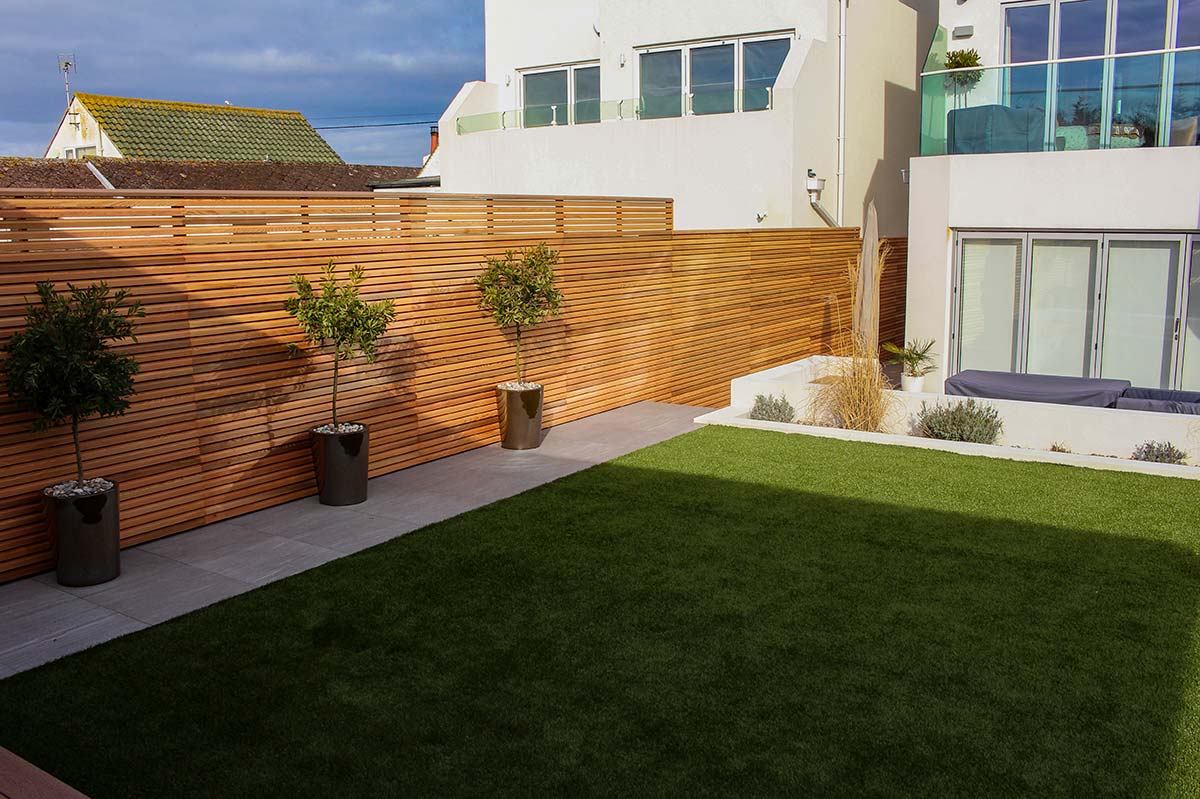Read our complete guide to garden sound proofing
Gardens are our sanctuaries where we want to relax and unwind. Sometimes this peace can be disrupted by noise pollution, particularly in built-up areas. Here we explain the many ways in which you can soundproof your garden and improve your outdoor space. Read on to find the right solution for you.
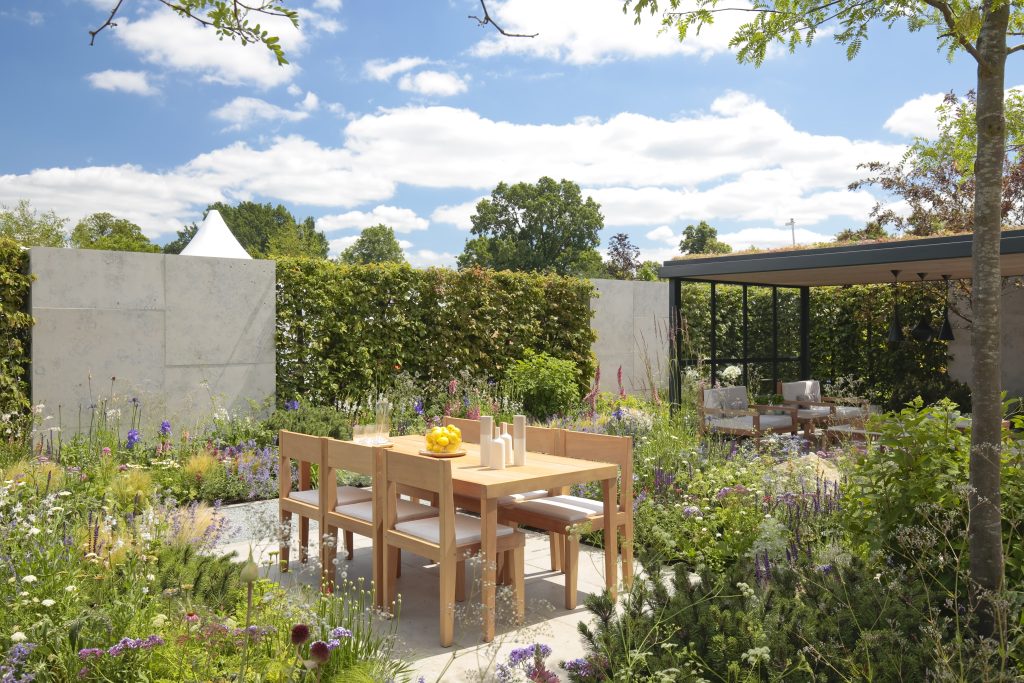
Sound attenuation or sound deflection
There are two methods which you can use to soundproof your garden: sound attenuation and sound deflection.
Sound attenuation essentially works by absorbing the sound waves to reduce the volume. This method muffles noise, without completely reducing it.
Sound deflection does what it says on the tin, creating a barrier that sound bounces back off. This is the superior choice when it comes to sounds such as traffic, but can also be the more expensive choice.
Factors to consider
There are a few factors you should consider before choosing your garden soundproofing. Firstly, height: to proficiently block out sound you will want your sound barrier to be around 2 metres high. This height may not be suitable for all materials, or for all outdoor spaces.
Next is density. The denser the material, the less noise will be able to pass through. If your garden has a lot of noise pollution, you may want to invest in the thickest option.
Coverage is next; a solid barrier, with no holes, will keep much more sound out compared to something with holes.
Finally, barrier placement should be considered. Where you position your barrier will play a role; you want it positioned as close as possible to the noise source for best results.
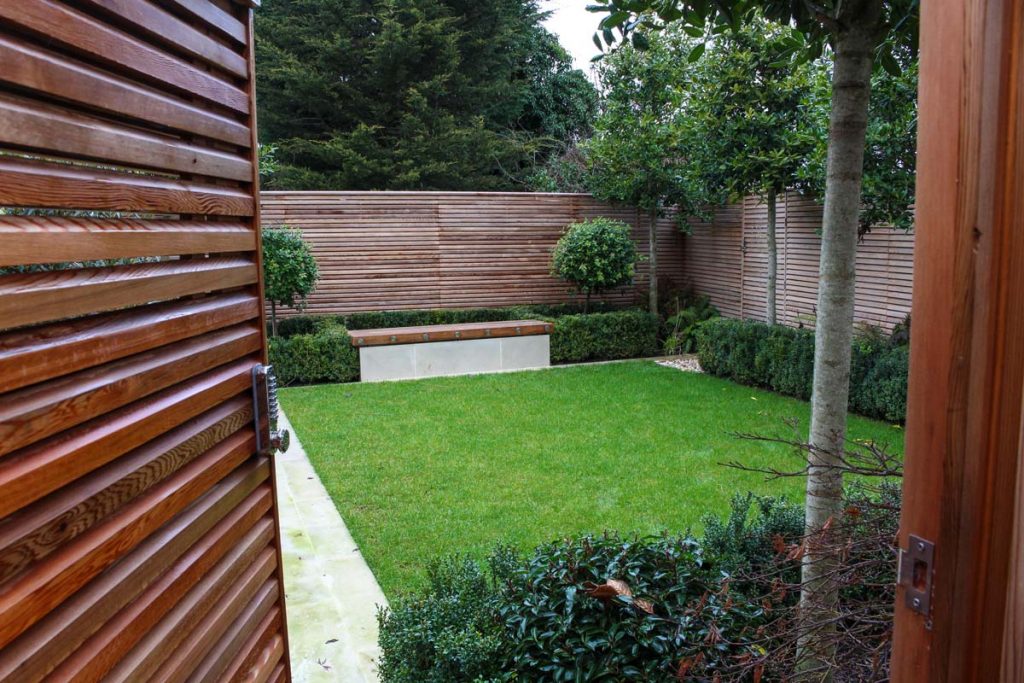
Wooden fencing
Wooden fencing can be one of the easiest and most cost-effective options to install. A tightly slatted fence panel can be the perfect choice for a quick and easy sound barrier. Fencing is a common garden choice and for that reason it is easily accessible. With so many styles and woods to choose from there are plenty of options available. With composite or wooden battens, you can even build a fence that is completely tailored to your garden's style and reflects your taste.
However, fencing is not the best choice for all types of sound pollution. Fencing is not the most effective form of noise reduction. For this reason, it is not necessarily suitable for highly noise-polluted areas. For lower-level noise it's a great choice with attractive options.
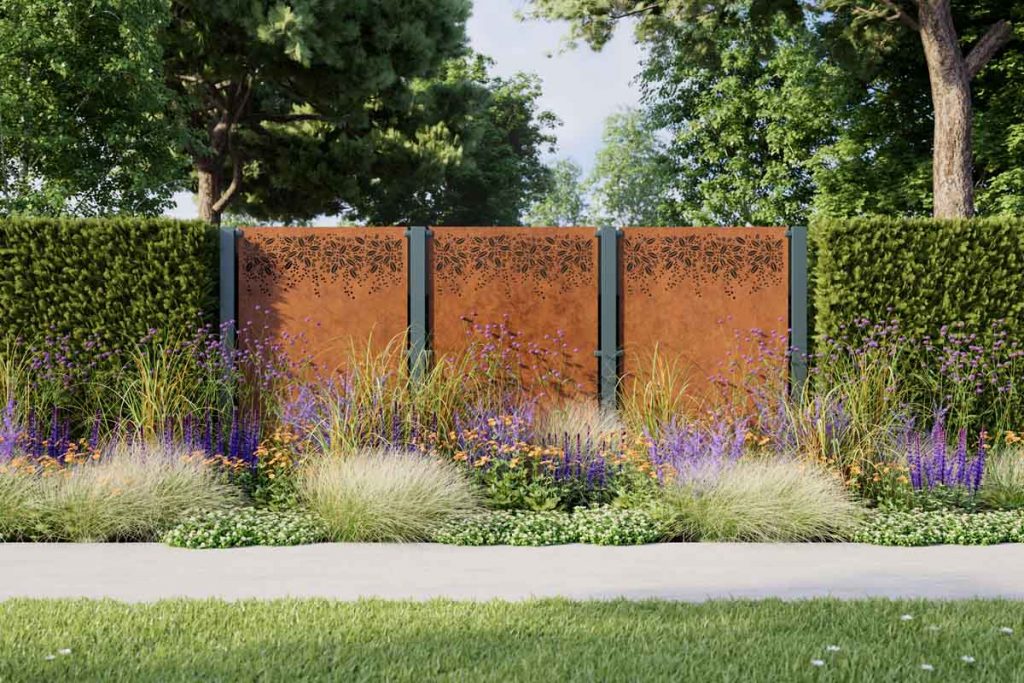
Metal screening
Metal screens are modern and stylish. With many great qualities for the garden, like being easy to maintain and durable, they can be an ideal solution. Bringing plenty of style to your space, as well as being a more unusual feature, they are a great way to make a statement. Working well to reduce airborne noise, they mask sounds such as neighbours talking and children shouting. However, just like fencing, they may not be the best choice for heavy noise pollution.
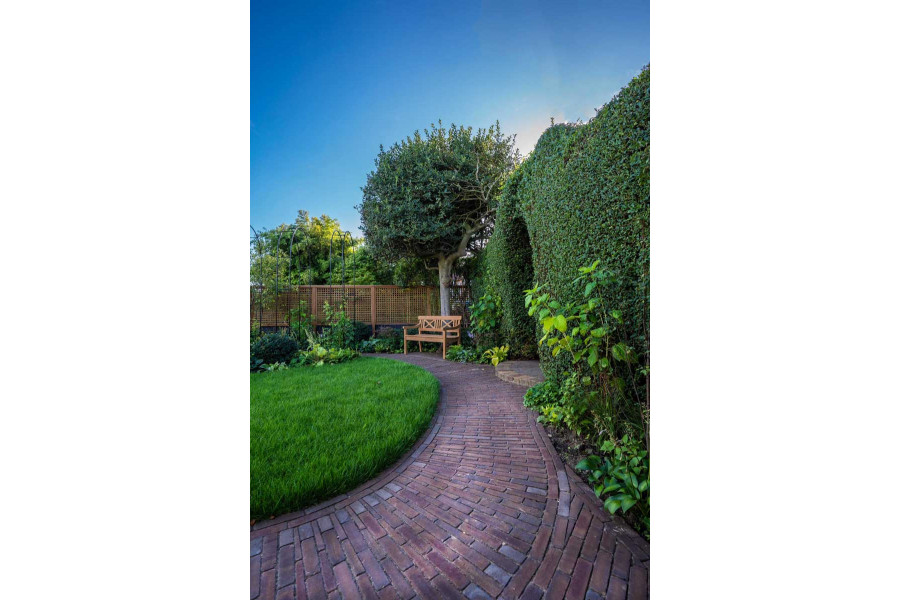
Hedging
Hedges are a great choice for sound attenuation. A thick hedge will do a great job for absorbing and muffling sound outside your garden. Not only are they ideal for noise reduction but they are also an attractive and natural choice. For those looking for a green ambience and wildlife-friendly choice, they are ideal.
However, the downfall of hedging can be its growing time. To get a dense enough hedge you may need to allow for a few years of growth. There is a way around this, you can pair a hedge with a fence for around the first five years, whilst the hedge matures. You can then either remove the fence of leave it for twice as much noise protection!
A well-established hedge will work wonders for muffling the sound of road traffic and can be used to reduce high levels of noise pollution. They can even replace unwanted noise pollution with more natural sounds, like the gentle rustling in a breeze. Be sure that your garden has enough room for the density of the hedge; if you have a small space vital open areas may be taken over by the hedging.
Brick Walls
A brick wall can be one of the most effective materials for soundproofing your garden. The bricks are a dense material which means that sound waves will have a tough time passing through them. They are also a rigid structure, which helps in the absorption of sound, effectively blocking out the majority of noise, even in heavily sound polluted areas.
Our natural brick walling is also an extremely attractive choice of materials and brings a stunning rustic feel to your garden. You can even grow vining plants up the walls to further enhance the natural aesthetic.
There are drawbacks to brick walling, though. Depending on how high you wish to build the wall, you may require planning permission, depending on local regulations. You should also consider your budget, and whether this method will fit within that.
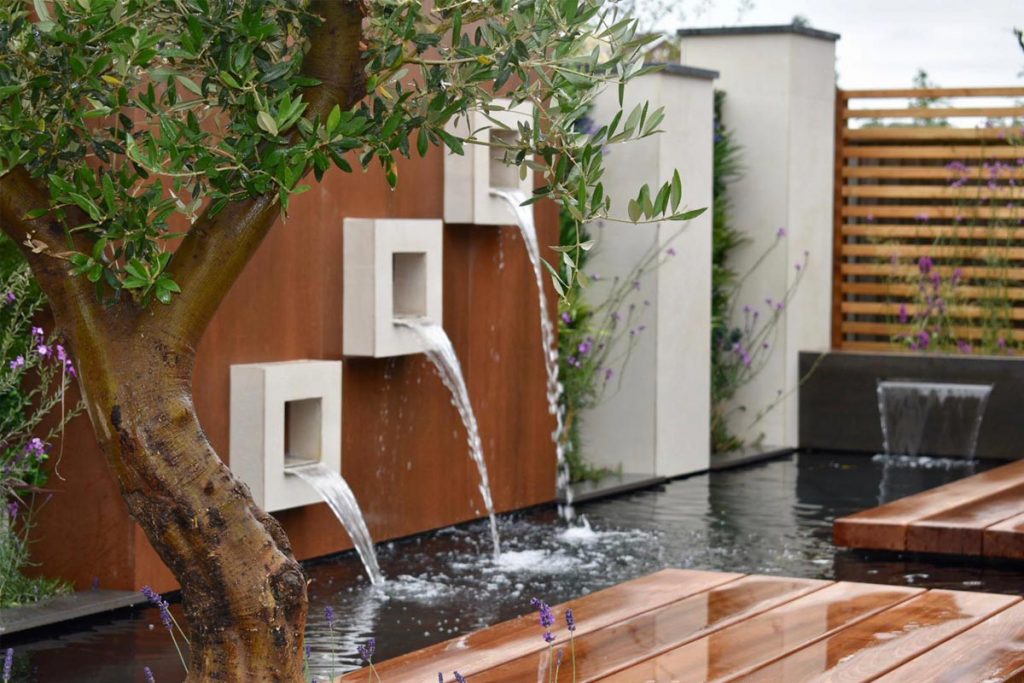
Masking the sound
There is an additional option available to you when it comes to noise pollution, and that is simply masking the sound with a more attractive noise.
An example of this is with a water feature. Not only do water features look attractive, but the gently trickling water can mask other noises and create a relaxing space.
Trees and planting are another great option. The natural foliage will have an element of noise attenuation, but also create natural sounds that will mask lighter levels of noise pollution.
Finally, there are wind chimes. These will create a gentle background noise that can mask more unpleasant sounds. These are, of course, weather dependent, as well as not for everyone. You might like to consider whether your neighbours will find them a constant irritation.
These options may work more effectively when paired with one of the aforementioned garden soundproofing options.


/filters:quality(60)/mediadev/media/menu-pics/all-porcelain.jpg )
/filters:quality(60)/mediadev/media/menu-pics/luxury-italian.jpg )
/filters:quality(60)/mediadev/media/menu-pics/premium-italian.jpg )
/filters:quality(60)/mediadev/media/menu-pics/budget-porcelain.jpg )
/filters:quality(60)/mediadev/media/menu-pics/large-format-porcelain.jpg )
/filters:quality(60)/mediadev/media/menu-pics/wood-effect-porcelain.jpg )
/filters:quality(60)/mediadev/media/menu-pics/porcelain-planks.jpg )
/filters:quality(60)/mediadev/media/menu-pics/porcelain-setts.jpg )
/filters:quality(60)/mediadev/media/menu-pics/browse-all-paving.jpg )
/filters:quality(60)/mediadev/media/menu-pics/stone-paving.jpg )
/filters:quality(60)/mediadev/media/menu-pics/interior-tiles.jpg )
/filters:quality(60)/mediadev/media/menu-pics/stone-effect-porcelain.png )
/filters:quality(60)/mediadev/media/menu-pics/wood-effect-porcelain.png )
/filters:quality(60)/mediadev/media/menu-pics/grey-porcelain.png )
/filters:quality(60)/mediadev/media/menu-pics/beige-porcelain.png )
/filters:quality(60)/mediadev/media/menu-pics/dark-porcelain.png )
/filters:quality(60)/mediadev/media/menu-pics/light-porcelain.png )
/filters:quality(60)/mediadev/media/menu-pics/patio-grout.jpg)
/filters:quality(60)/mediadev/media/menu-pics/primers.jpg)
/filters:quality(60)/mediadev/media/menu-pics/porcelain-blades.jpg)
/filters:quality(90)/mediadev/media/menu-pics/drainage.jpg)
/filters:quality(60)/mediadev/media/menu-pics/cleaners.jpg)
/filters:quality(60)/mediadev/media/menu-pics/all-stone-paving.jpg )
/filters:quality(60)/mediadev/media/menu-pics/all-sawn-paving.jpg )
/filters:quality(60)/mediadev/media/menu-pics/all-riven-paving.jpg )
/filters:quality(60)/mediadev/media/menu-pics/indian-sandstone.jpg )
/filters:quality(60)/mediadev/media/menu-pics/limestone-paving.jpg )
/filters:quality(60)/mediadev/media/menu-pics/granite-paving.jpg )
/filters:quality(60)/mediadev/media/menu-pics/slate-paving.jpg )
/filters:quality(60)/mediadev/media/menu-pics/yorkstone-paving.jpg )
/filters:quality(60)/mediadev/media/menu-pics/stone-pavers.jpg )
/filters:quality(60)/mediadev/media/menu-pics/cobbles-setts.jpg )
/filters:quality(60)/mediadev/media/menu-pics/plank-paving.jpg )
/filters:quality(60)/mediadev/media/menu-pics/paving-circles.jpg )
/filters:quality(60)/mediadev/media/menu-pics/bespoke-paving-1.jpg )
/filters:quality(60)/mediadev/media/menu-pics/edging-stones-1.jpg )
/filters:quality(60)/mediadev/media/menu-pics/prestige-stone.jpg )
/filters:quality(60)/mediadev/media/menu-pics/grey-blue-stone.png)
/filters:quality(60)/mediadev/media/menu-pics/swatch-black-dark.jpg )
/filters:quality(60)/mediadev/media/menu-pics/swatch-buff-beige-white.jpg )
/filters:quality(60)/mediadev/media/menu-pics/sealants.jpg)
/filters:quality(60)/mediadev/media/menu-pics/all-clay-paving.jpg )
/filters:quality(60)/mediadev/media/menu-pics/alpha-clay-pavers.jpg )
/filters:quality(60)/mediadev/media/menu-pics/cottage-garden-clay-pavers.jpg )
/filters:quality(60)/mediadev/media/menu-pics/kessel-garden-clay-pavers.jpg )
/filters:quality(60)/mediadev/media/menu-pics/artisan-clay-pavers.jpg )
/filters:quality(60)/mediadev/media/menu-pics/grey-blue-clay-paver.png )
/filters:quality(60)/mediadev/media/menu-pics/red-brown-clay-pavers.png )
/filters:quality(60)/mediadev/media/menu-pics/beige-buff-clay-pavers.png )
/filters:quality(60)/mediadev/media/menu-pics/composite-decking.jpg )
/filters:quality(60)/mediadev/media/menu-pics/designboard-decking.jpg )
/filters:quality(60)/mediadev/media/menu-pics/classic-designboard.jpg )
/filters:quality(60)/mediadev/media/menu-pics/brushed-designboard.jpg )
/filters:quality(60)/mediadev/media/menu-pics/grooved-designboard.jpg )
/filters:quality(60)/mediadev/media/menu-pics/millboard-decking.jpg )
/filters:quality(60)/mediadev/media/menu-pics/grey-decking.jpg )
/filters:quality(60)/mediadev/media/menu-pics/black-charcoal-decking.jpg)
/filters:quality(60)/mediadev/media/menu-pics/brown-decking.jpg)
/filters:quality(60)/mediadev/media/menu-pics/all-build-deck.png )
/filters:quality(60)/mediadev/media/menu-pics/stone-cladding.jpg )
/filters:quality(60)/mediadev/media/menu-pics/all-garden-walling-1.jpg )
/filters:quality(60)/mediadev/media/menu-pics/facing-bricks.jpg )
/filters:quality(60)/mediadev/media/menu-pics/garden-screening.jpg )
/filters:quality(60)/mediadev/media/menu-pics/all-steps-coping.jpg )
/filters:quality(60)/mediadev/media/menu-pics/stone-garden-steps.jpg )
/filters:quality(60)/mediadev/media/menu-pics/sawn-steps.jpg )
/filters:quality(60)/mediadev/media/menu-pics/riven-steps.jpg )
/filters:quality(60)/mediadev/media/menu-pics/yorkstone-steps.jpg )
/filters:quality(60)/mediadev/media/menu-pics/bespoke-steps.jpg )
/filters:quality(60)/mediadev/media/menu-pics/porcelain-steps.jpg )
/filters:quality(60)/mediadev/media/menu-pics/off-the-shelf.jpg )
/filters:quality(60)/mediadev/media/menu-pics/stone-coping.jpg )
/filters:quality(60)/mediadev/media/menu-pics/sawn-coping.jpg )
/filters:quality(60)/mediadev/media/menu-pics/riven-coping.jpg )
/filters:quality(60)/mediadev/media/menu-pics/yorkstone-coping.jpg )
/filters:quality(60)/mediadev/media/menu-pics/bespoke-coping.jpg )
/filters:quality(60)/mediadev/media/menu-pics/stone-pier-caps.jpg )
/filters:quality(60)/mediadev/media/menu-pics/porcelain-coping.jpg )
/filters:quality(60)/mediadev/media/menu-pics/all-bespoke-services.jpg )
/filters:quality(60)/mediadev/media/menu-pics/bespoke-paving-2.jpg )
/filters:quality(60)/mediadev/media/menu-pics/bespoke-steps-1.jpg )
/filters:quality(60)/mediadev/media/menu-pics/bespoke-coping-1.jpg )
/filters:quality(60)/mediadev/media/menu-pics/edge-profiles.jpg )
/filters:quality(60)/mediadev/media/menu-pics/masonry-services.jpg )
/filters:quality(60)/mediadev/media/menu-pics/deluxe-pergolas.jpg )
/filters:quality(60)/mediadev/media/menu-pics/proteus-pergolas.jpg )



